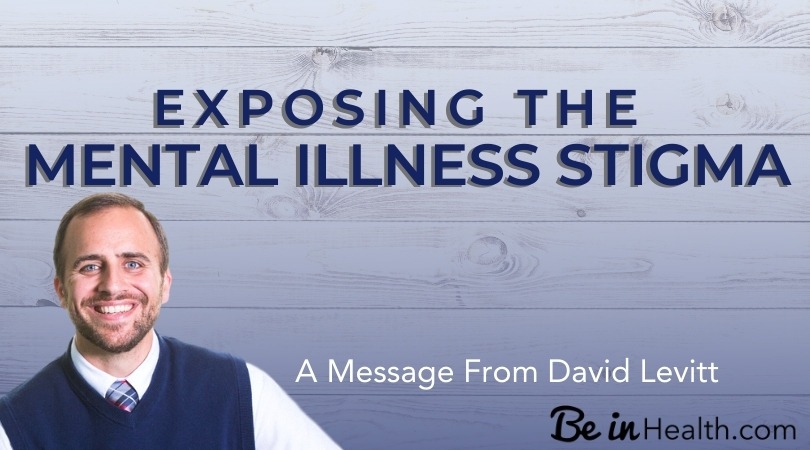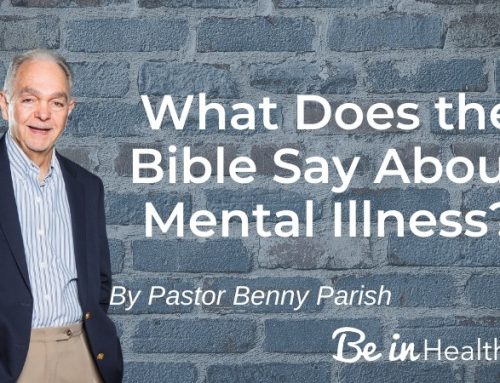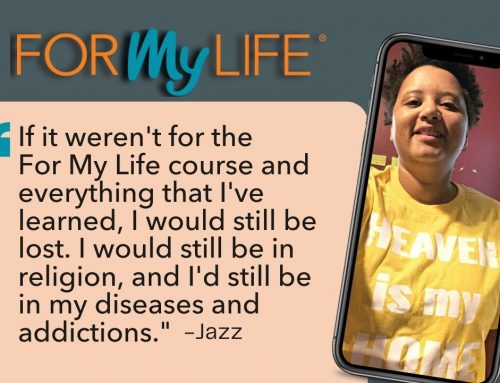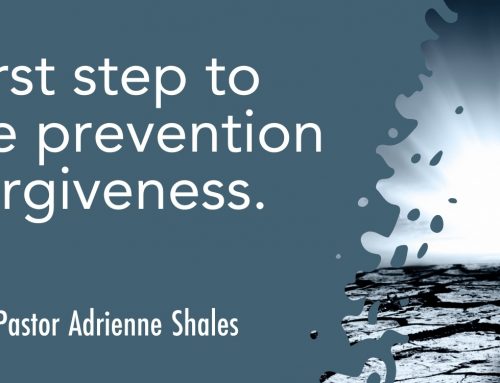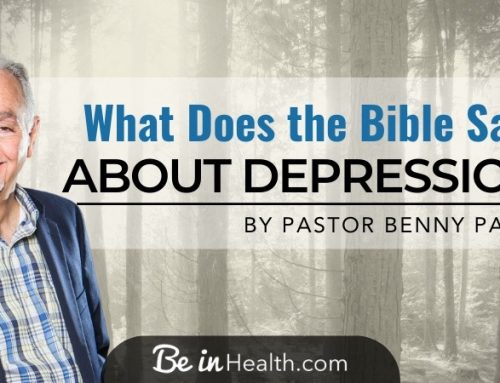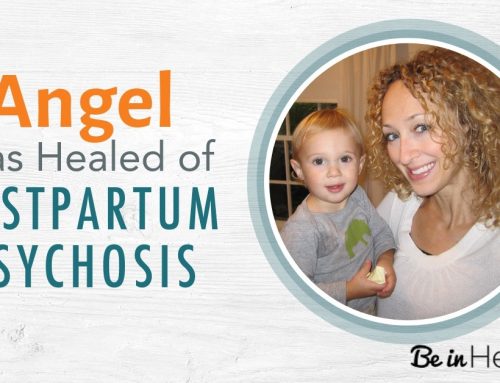Exposing the Mental Illness Stigma: A Believer’s introduction into Addressing and Stopping the Stigma of Mental Illness in our Community
After yet another mass shooting, this time in El Paso, TX, President Donald Trump went on record to suggest, “Mental illness and hatred pulls the trigger, not the gun.” All due respect to President Trump and all he has done for our country, but I am not in total agreement with his assessment. I totally agree with his stance against hatred, but mental illness does not pull a trigger. His statements, although well intentioned, only further represents the general fear of mental illness and the stigma that many people struggling with a mental illness may encounter. It is this mental illness stigma that convinces them to stay isolated and out of relationships that they need so badly so that they can be healed.
If this stigma of having a mental illness of any kind puts you in the category that you might be more likely to commit a crime then, you might be more inclined to keep your struggles to yourself and become more confused and angry. There has to be a standard of conduct for God’s people so that we don’t drive those who are struggling with mental illness away but rather, we can provide a safe place for them to overcome and find healing.
Misplaced labels
In our society, we use terms and phrases that have become connected to mental illness. Words and phrases like: They are bonkers, they went ape, the looney bin, the nuthouse, the cuckoo’s nest (there is a whole movie about that one) have all become just about synonymous with the term mental illness. No wonder people who are genuinely struggling with depression, anxiety, panic attacks, hearing voices, and a host of other symptoms don’t seek help until it is truly unbearable. Who wants to be put into those categories?
Mishandled by the church
Then if someone does open up and ask for help from a pastor or someone else, they are passed off, by that I mean, referred to the psychiatrists for care. How would it make you feel if someone “doesn’t know what to do with you?” Many times that person becomes one of those “special cases,” and we know that psychiatrists only deal with “really special cases,” right?
A call to action
Now please don’t misunderstand me, this blog is in no way about political correctness and creating safe zones for people by infringing on the first amendment. It is about calling to attention a major deficit in the Body of Christ in the area of a mission that we are all called to participate in. That is caring for and restoring the weak and brokenhearted.
The Spirit of the Lord is upon me,because he hath anointed me to preach the gospel to the poor; he hath sent me to heal the brokenhearted, to preach deliverance to the captives, and recovering of sight to the blind, to set at liberty them that are bruised. Luke 4:18 KJV
Jesus set the example for us
This is what Jesus did while he was here. Today, many of the people He healed and delivered would have been classified as being mentally ill and pushed aside as a problem to society-even someone to be feared and avoided.
And his fame went throughout all Syria: and they brought unto him all sick people that were taken with divers diseases and torments, and those which were possessed with devils, and those which were lunatic, and those that had the palsy; and he healed them. Matthew 4:24 KJV
Rest for the weary
Christ didn’t try to avoid anyone that was down and out. In fact, he exhorted them to come to Him that they could find rest for their souls.
Come unto me, all ye that labour and are heavy laden, and I will give you rest. 29 Take my yoke upon you, and learn of me; for I am meek and lowly in heart: and ye shall find rest unto your souls. 30 For my yoke is easy, and my burden is light. Matthew 11:28-30 KJV
You might be thinking, David, this is just talking about some tired, stressed people. Nope, look at these words closely in the definitions: Those that labored and were heavy laden were those that were depressed, hopeless, worn out from trying too hard in their own strength and weary of life. Jesus said, “come.”
Who does His work now?
Today, Jesus is not here on earth to do all this. So, do the Father and Jesus just do all this sovereignly from heaven? No, Jesus and the Father are now asking you and me to get involved and bring healing to the brokenhearted in Jesus’ name through the instruction of the Word of God and by the power of the Holy Spirit.
Verily, verily, I say unto you, He that believeth on me, the works that I do shall he do also; and greater works than these shall he do; because I go unto my Father. John 14:12 KJV
Heal the sick, cleanse the lepers, raise the dead, cast out devils: freely ye have received, freely give. Matthew 10:8 KJV
The situation might seem hopeless…
Many times, the diagnosis of a mental illness comes with a lot of shame. Satan and his kingdom will see to that. Most people diagnosed do not want to be in that state of mind they are in, they want to change. They want to be a better friend and family member; they want to be doing better and be happier… But they don’t know how. They are reeling under the dysfunction of their brain, and the pain in their spirit. The people around them don’t know what to do with them any more than the person diagnosed knows what to do, so they receive a label to explain what is going on: Major Depressive Disorder, Bi-Polar I/II, Schizophrenia, PTSD, and so on. Then they are told this will be a lifelong condition that you need to accept. It is now just a part of who you are.
Another way of looking at the stigma of mental illness
When someone gets cancer, no one says, “Did you hear about Bob? He is cancer”. They say, “Oh Bob, he has cancer. What a great guy; I need to go visit him.” However, if someone is diagnosed with one of these mental illnesses, many people would say, “Oh Bob, he is Bi-Polar. He just can’t snap out of it; he WAS such a great guy, not sure what happened to him.” We visit Bob with cancer because we know he is “still there,” but we may not visit Bob with Bi-Polar because we are not sure if he is “still there.” This makes us feel uncomfortable. Trust me, I assure you, Bob is still there and could use a friend.
Where does the church stand?
The Church has fallen right into this snare of stigmatizing those struggling with issues of the soul. Why? Because the Body of Christ has a fear of mental illness. We are all afraid of things we don’t know how to handle. But why do we think we don’t know how to handle it? Doesn’t the Word give us instructions? It does, but rarely have we been taught how to help our brothers and sisters recover and be healed.
Our understanding may need readjustment
One of the tragedies during the Enlightenment period was that the natural took preeminence over the spiritual. Society, including the Church, began to focus on understanding life from a natural, scientific vantage point. That is not wrong but should not have come at the expense of understanding the spiritual part of who we are. During this time, the understanding of who we are as spiritual beings was diminished. As a result, understanding of how to deal with spiritual problems that caused problems in the mind and body was diminished. We are still there today, even the Church. That is one of the reasons why we so easily pass those with a mental illness off to the scientific community.
When you fear something, it is easy to let someone else handle it, but Jesus is the chief Bishop and Shepherd of our soul.
For ye were as sheep going astray; but are now returned unto the Shepherd and Bishop of your souls. 1 Peter 2:25 KJV
Can we let God lead us?
The result of Jesus being the Shepherd and Bishop of our souls is found in Psalm 23:1-3. He leads us into ways of thinking, speaking, acting, and looking at the world that brings restoration to our souls.
The LORD is my shepherd; I shall not want. 2 He maketh me to lie down in green pastures: he leadeth me beside the still waters. 3 He restoreth my soul: he leadeth me in the paths of righteousness for his name’s sake. Psalm 23:1-3 KJV
We need to me a safe place
The Church needs to be the place of refuge, a place of understanding, and a place to get our heads straight and our thinking established in peace. Should we, as sons and daughters of God the Father, be afraid of a person’s mental struggles? We are the ones with answers. Our God can do anything and change anyone; we have the power by the Holy Spirit to make a difference, but we often withdraw because mental illness is “scary”, and we would rather not think about it.
My personal history with mental health
I hope it does not come across as if I am ranting, but you must know that I understand both sides of the equation from personal experience. Growing up, I looked at people that had depression and other mental diagnoses as someone that just couldn’t get a grip. Jokes about “people like that” were made, and really their value as a human was diminished in my thinking. To be honest, I was afraid of people with a mental illness. They were different than me, and I never thought that I’d have to deal with those things. How could I relate?
Then I experienced my own struggles in life that I thought I was immune to. After losing two family members a month and a half apart from each other, I began to go to a place I never saw coming. I experienced panic attacks and depression, and was eventually diagnosed as PTSD. Now, all of a sudden, I was that person I didn’t understand. Because I had avoided others, I knew how I use to think about someone with these struggles. I believed that surely others thought the same way about me. I tried living in denial, but the thoughts were too strong to push down and ignore. In reality, I probably stigmatized myself more than anyone else did. Was I defective? Was there something wrong with my brain?
Is there something wrong with your brain?
With what is commonly referred to as mental illness is this idea that there is something wrong with your brain. Actually, there is nothing wrong with it in most cases; in fact it is working just fine. How can I say that the brain of someone with a mental illness is working just fine? I am not suggesting it is working in an optimal way to enjoy life and relationships, but it is working.
Your brain is designed as a responder to what is happening spiritually. The brain responds to ways of thinking that a person agrees with at the spirit level. Then through the spirit-soul-body connection, the brain conforms in over-activity or under-activity in one or many of its regions. If your brain is responding and conforming to unrighteous thinking, that means it is working, but the fruit is torment and oppression.
How Be in Health® helped me
One of the things that I appreciated most about when I first came to Be in Health was that no one was shocked or treated me “special” because of what I was going through. I was just another person overcoming something in my life. To me, that was great because all I wanted to be was normal. At Be in Health, a diagnosis did not decrease my value, did not determine my future, or anyone’s love for me. I was not stigmatized or put in a special category. No one was afraid of me; they treated me like everyone else.
They judged me based on the Word: That I am a son of God learning to be a son of God, and that I am fearfully and wonderfully made. Not only that but they also had faith that I could be healed and live a healthy and joyful life. And now I do!
What am I getting at?
So, you must understand, I am not trying to advocate for some kind of injustice done against me that I still struggle with daily. Please don’t take my zeal as bitterness toward those that have stigmas or fear toward people with a mental illness.
I am trying to help us all understand from my perspective as someone who has been healed and overcome mental illness what works from a scriptural standpoint and exhort us all to do it!
The ability for someone with a mental illness to simply be accepted and loved for who they are rather than how they perform is key to the complete healing of mental illness.
An eye-opening experiment
Peter Breggin, a well-known psychiatrist, was a freshman at Harvard University in the 1950s. [1] He was part of an experiment where untrained freshmen were paired up for a year with patients in a psychiatric hospital. The director of the hospital was not in favor of the experiment. He wanted to prove that untrained volunteers could in no way be able to help in comparison to trained mental health professionals and psychiatrists. Therefore, he paired each untrained volunteer with the most severe cases of schizophrenics and psychotics in the hospital.
The experiment simply consisted of the untrained volunteers meeting with the same person once a week. These untrained volunteers would simply listen to the hearts of the patients, show kindness, go for walks, and just be there for them once a week. Within one year, eleven of the fourteen patients made a full recovery from their condition and were released for the hospital. Rather than drugs, it was love, care, and affirmation that those patients needed most.
A real testimony of healing
At Be in Health, we have a similar testimony of a man that heard our teachings and decided to test the scripture that says perfect love casts out fear. He dedicated every Saturday for an entire year and spent it with his brother, who had been diagnosed with schizophrenia. He had no plan, but to just spend time with his brother and love on him. By the end of that year, his brother had made a full recovery from schizophrenia and was able to begin working and eventually get married!
Serious questions we must address:
Who made this so complicated? Who made the healing of mental illness so hard?
Have the scriptures become a cliché to us? Have they lost their meaning and promise of what they can accomplish if we do them?
Where healing can begin
The Bible says to weep with those that weep.
Rejoice with them that do rejoice, and weep with them that weep. 16 Be of the same mind one toward another. Mind not high things, but condescend to men of low estate. Be not wise in your own conceits. Romans 12:15-16 KJV
When one member hurts, the whole body hurts….
That there should be no schism in the body; but that the members should have the same care one for another. 26 And whether one member suffer, all the members suffer with it; or one member be honoured, all the members rejoice with it. 1 Corinthians 12:25-26 KJV
We should confess our faults one to another that we may be healed.
Confess your faults one to another, and pray one for another, that ye may be healed. The effectual fervent prayer of a righteous man availeth much. James 5:16 KJV
Perfect love cast out fear which has torment.
There is no fear in love; but perfect love casteth out fear: because fear hath torment. He that feareth is not made perfect in love. 1 John 4:18 KJV
How can we follow Jesus’ example?
Are we watching over the souls of our brothers and sisters? Have we discounted the power over the spirit of fear that a hug can bring? Do we know how to bring healing to the brokenhearted? Jesus did, and we are his witnesses here and have been asked to do the same things. He knew when to have compassion, He knew when to cast out an evil spirit, and He knew when to confront and admonish someone to help them overcome. One or more of these is usually necessary for helping someone heal from mental illness.
There is still a place for personal responsibility
I know that each person is responsible for their own life, and much of what happens in healing and recovery from mental illness depends on the decisions they make in their own heart. I know that someone develops a mental illness because of responses to life circumstances that do not reflect the mind of Christ, but none of us can do it alone. We need each other.
A More Excellent Way:
Do you know what an even greater principle than helping people recover from a mental illness is? Rather than just helping people to recover from mental illness, what if we establish a community that would help to prevent mental illness? When traumas, disappointments, betrayals, and loss come up in life, what if people had a place of refuge and comfort not just in God but in the Body of Christ without stigma? We could prevent this stuff. But the stigma, shame, and fear are going to have to be defeated and replaced with Biblical knowledge, compassion, and the power of the Holy Spirit.
You’ve been called, will you listen?
I know that the Church has unknowingly been influenced by the world that has painted mental illness as something to leave up to the “experts.” And at times, there is a place for that. But I want to encourage you, the Church, the pillar and ground of the truth, that you have the solutions. You have the power of the Holy Spirit, and the Father wants to use you in bringing complete healing to people where the world can only bring management of symptoms.
I am not suggesting you just start taking on a bunch of difficult cases. But I am exhorting you to get involved. Learn how to and grow in helping people so that you can be the gift to mankind that He has called you to be. You will be amazed at the difference you can make in the lives of others. But none of this will happen if we keep the fear and stigma of mental illness in our midst.
Because of Him,
David Levitt
There is still so much to say for both sides, be sure to check out the “God is Greater than Mental Illness” conference happening Dec 14th. This is a Christian mental health conference in which I will be discussing how those struggling with mental illness can make a full recovery in God and how those that want to help can do so according to God’s Word.
[1]
Peter R. Breggin, Toxic Psychiatry: Why Therapy, Empathy, and Love Must Replace Drugs, Electroshock, and Biochemical Theories of the “New Psychiatry” (New York: St. Martin’s Press, 1991) pp.9-11

